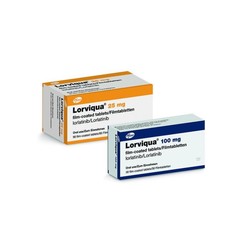Pfizer Korea said that its ALK (anaplastic lymphoma kinase)-positive non-small cell lung cancer (NSCLC) treatment Lorviqua 25mg and 100mg had received approval from the Ministry of Food and Drug Safety.

While the ministry approved the drug to treat adult patients with ALK-positive advanced NSCLC, hospitals can use the drug as a monotherapy only when a patient received alectinib or ceritinib as a first-line ALK inhibitor or when treated with crizotinib or at least another ALK inhibitor.
Although ALK-positive NSCLC patients account for less than 5 percent of patients with advanced NSCLC, there is a high demand for new drugs due to frequent recurrence and poor prognosis. In addition, more than half of the patient groups see their cancer metastasize to the central nervous system.
Due to such high unmet needs, Lorviqua received the most investigational new drug approval in the first half of this year.
The investigational new drug is a system that approves the use of drugs by hospitals only for clinical trials in ordinary circumstances before product approval and provides treatment opportunities to patients with severe, life-threatening diseases who have no other therapeutic means or who have severe life-threatening diseases.
In clinical trials, Lorviqua effectively treated ALK-positive NSCLC in one main study, which included 139 patients whose disease had worsened despite treatment with either alectinib or ceritinib or with crizotinib and another ALK tyrosine kinase inhibitor.
The company assessed the response to treatment by using body scans and standardized criteria for evaluating solid tumors.
Around 43 percent of patients who had previously received treatment with alectinib or ceritinib showed a complete or partial response to the medicine.
Among patients who had received treatment with crizotinib and another ALK tyrosine kinase inhibitor, about 40 percent showed a complete or partial response to the medicine.
Lorviqua was also effective when cancer had spread to the brain. Depending on which previous treatment the patients had received, around 67 and 52 percent of patients treated with Lorviqua showed no or fewer signs of cancer in the brain.

